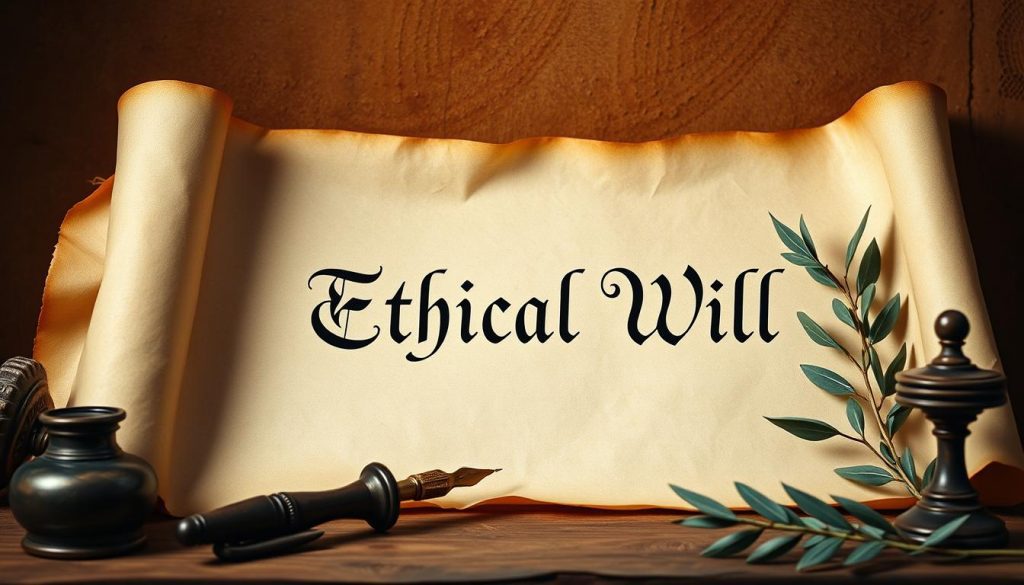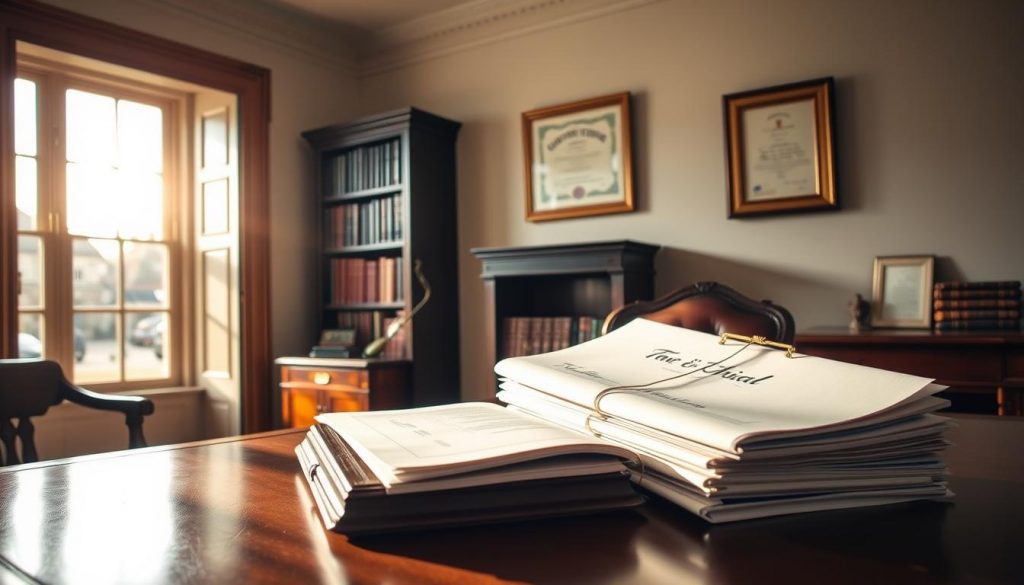As we navigate the complexities of estate planning, it’s essential to consider the emotional and sentimental aspects of leaving a legacy for our loved ones. An ethical will is a personal document that conveys our values, experiences, and life lessons to future generations.
Unlike a traditional will, an ethical will is not a legal document, but rather a meaningful way to pass down family heritage and values. It can take the form of a written letter, a video recording, or even a series of conversations with family members.
By crafting an ethical will, families in the UK can create a lasting legacy that transcends material wealth. We will explore the significance of this process and provide guidance on how to create a meaningful ethical will.
Key Takeaways
- Crafting an ethical will is a meaningful way to pass down family values and heritage.
- An ethical will is a personal document that conveys life lessons and experiences.
- It can take various forms, including written letters or video recordings.
- Estate planning is not just about material wealth; it’s also about leaving a lasting legacy.
- Families can benefit from creating a lasting legacy that transcends financial assets.
What is an Ethical Will?
An ethical will is a personal statement that conveys an individual’s values and principles to their loved ones. Simply put, it is one’s personal mission statement, expressing the most important and unique part of each of us: what we stand for.
Definition and Purpose
An ethical will, also known as an ethical testament or ethical bequest in the UK, is a document that outlines an individual’s core values, beliefs, and life lessons. Its primary purpose is to provide a meaningful way for individuals to share their heritage and legacy with future generations.
The key components of an ethical will include:
- Personal reflections on life experiences
- Values and beliefs that have guided one’s decisions
- Life lessons learned throughout the years
By including these elements, an ethical will serves as a powerful tool for strengthening family bonds and leaving a lasting legacy.
Historical Context
The concept of ethical wills has its roots in ancient traditions. Historically, individuals would pass down letters, stories, or other personal documents to their descendants, sharing their wisdom and values.
Today, the concept has evolved, and ethical wills are recognized as a valuable complement to traditional wills. The following table highlights the evolution of ethical wills:
| Period | Characteristics | Significance |
|---|---|---|
| Ancient Times | Oral traditions and written letters | Passing down wisdom and values |
| Modern Era | Formalized documents and personal statements | Complements traditional wills, providing a personal legacy |

As seen in the table, the concept of ethical wills has adapted over time, becoming a significant aspect of estate planning in the UK.
Importance of Ethical Wills in the UK
The practice of creating an ethical will, rooted in ancient traditions, is increasingly relevant for UK families today. “Writing an ethical will is a practice that dates back thousands of years in Jewish and later Judeo-Christian tradition,” highlighting its significance across cultures and time. An ethical will serves as a powerful tool for families to pass down their values, stories, and legacy to future generations.
Strengthening Family Bonds
Ethical wills play a crucial role in strengthening family bonds by sharing personal stories, values, and life lessons. This document allows family members to connect on a deeper level, fostering a sense of unity and understanding. By passing down these stories and values, families can preserve their heritage and cultural identity.
For instance, an ethical will can include personal reflections on significant family events, historical context, and the values that have been passed down through generations. This not only helps in preserving family history but also in guiding younger generations.
Key benefits of ethical wills in strengthening family bonds include:
- Preserving family stories and history
- Passing down values and beliefs
- Fostering a sense of unity and connection among family members
Leaving a Personal Legacy
An ethical will is also a means of leaving a personal legacy that transcends material wealth. It provides an opportunity to share life experiences, wisdom, and personal values, creating a lasting impact on future generations. As noted by estate planning experts at MPEstatePlanning, incorporating ethical wills into estate planning can enhance the overall legacy of an individual.
“An ethical will is a gift of love and wisdom from one generation to the next, providing a roadmap for living a meaningful life.”
By crafting an ethical will, individuals can ensure that their personal legacy continues to inspire and guide their family for years to come.
Key Components of an Ethical Will
Crafting an ethical will requires thoughtful consideration of the personal reflections, values, and life lessons you wish to share with your family. In the context of ethical inheritance UK and ethical wealth transfer UK, it’s about passing on more than just material wealth; it’s about leaving a legacy that resonates with your loved ones.

Personal Reflections
Personal reflections are a crucial element of an ethical will. They involve looking back on your life, identifying key moments, and understanding how these experiences have shaped you. Consider questions like: “What were the people in your life who most influenced you? What do you love best about them?” These reflections help to capture the essence of your personal journey and the values you’ve developed over time.
Values and Beliefs
Your values and beliefs are the foundation upon which your ethical will is built. They guide your decisions and actions, and sharing them with your family can provide a sense of continuity and direction. When articulating your values, consider what you stand for, what you believe in, and how these principles have influenced your life choices.
Life Lessons and Stories
The life lessons you’ve learned and the stories you’ve accumulated over the years are invaluable to your family. They offer practical wisdom and insight, helping future generations navigate their own paths. When sharing these stories, focus on the lessons derived from your experiences and how they can be applied in different contexts.
| Component | Description | Example |
|---|---|---|
| Personal Reflections | Significant life events and influences | “My grandmother’s resilience during difficult times has always inspired me.” |
| Values and Beliefs | Core principles guiding your decisions | “I believe in the importance of honesty and integrity in all aspects of life.” |
| Life Lessons and Stories | Wisdom gained from experiences | “One of the most important lessons I’ve learned is the value of perseverance.” |
How to Start Writing an Ethical Will
Starting to write an ethical will can be a daunting task, but with the right guidance, it can become a meaningful experience for you and your family. An ethical will is a personal document that conveys your values, beliefs, and life lessons to your loved ones, providing them with a deeper understanding of your legacy.
Choosing the Right Format
When it comes to choosing the right format for your ethical will, there are several options to consider. You may prefer a traditional written document, a video recording, or even a digital format such as a blog or a series of emails. The key is to select a format that feels comfortable and authentic to you.
For those who are unsure, exploring available templates and examples can be a helpful starting point. This can give you a sense of the different structures and styles that you can adopt or adapt to suit your needs.
Setting the Right Tone
The tone of your ethical will should reflect your personality and the message you wish to convey. It’s essential to be sincere and genuine in your writing or recording, as this will resonate more deeply with your family.
Consider beginning with a personal reflection or a significant life story that encapsulates your values. This can help set a heartfelt tone for the rest of your ethical will.
FAQs to Consider
Many individuals have questions when starting to write an ethical will. Here are a few frequently asked questions and their answers:
| Question | Answer |
|---|---|
| Do I need a lawyer to write an ethical will? | No, ethical wills are not legally binding documents, so you do not need a lawyer to create one. |
| Can I update my ethical will? | Yes, it’s a good idea to review and update your ethical will periodically to reflect changes in your life and values. |
| How do I share my ethical will with my family? | You can share it during a family gathering, or you can leave it as part of your estate for your loved ones to discover later. |
For more guidance on writing an ethical will, you may find it helpful to consult resources that provide support and templates for this process. By taking the time to craft a thoughtful ethical will, you can leave a lasting legacy that enriches the lives of your family members.
Ethical Wills vs. Traditional Wills
UK families are now considering ethical wills alongside traditional wills to ensure a comprehensive estate plan. While traditional wills have long been a cornerstone of estate planning, ethical wills offer a unique opportunity to pass down personal values, life lessons, and family history.

Key Differences Explained
The primary difference between an ethical will and a traditional will lies in their purpose and legal standing. A traditional will is a legally binding document that outlines the distribution of your assets after you pass away. In contrast, an ethical will, also known as a legacy letter or heritage document, is a personal statement that conveys your values, beliefs, and life experiences to your loved ones.
As noted by a third-party source, “An Ethical Will is a personal document that communicates values, experiences, and life lessons.” This type of will is not legally binding but serves as a meaningful way to connect with future generations and provide them with a deeper understanding of your heritage.
Key differences include:
- Legal standing: Traditional wills are legally enforceable, while ethical wills are not.
- Purpose: Traditional wills distribute assets, whereas ethical wills share personal values and life stories.
- Content: Traditional wills typically include financial information, whereas ethical wills focus on personal reflections and family history.
Complementary Purpose
While traditional and ethical wills serve different purposes, they can complement each other beautifully. By creating both, you can ensure that your estate is managed according to your wishes while also leaving a lasting legacy for your family.
“The way to get started is to quit talking and begin doing.” – Walt Disney
This quote encapsulates the essence of creating both types of wills: taking action to secure your family’s future and leave a lasting impact.
In conclusion, understanding the differences and complementary purposes of ethical and traditional wills can help UK families create a more comprehensive estate plan. By considering both, you can ensure that your assets are distributed according to your wishes while also sharing your values and legacy with future generations.
Legal Considerations in the UK
In the UK, ethical wills are subject to specific legal considerations that must be navigated. While an ethical will is not a legally binding document in the same way a traditional will is, it is still important to understand the legal context in which it operates.

Understanding Legal Terminology
Legal terminology can be complex, but understanding key terms is crucial when creating an ethical will. For instance, in England & Wales, a person has full testamentary freedom, meaning they may dispose of their estate upon death as they wish. This principle underscores the flexibility individuals have in managing their estate, including the creation of ethical wills that reflect their personal values and wishes.
It’s also important to be aware of the legal definitions surrounding wills and estates. Terms like “executor” and “beneficiary” have specific legal meanings that impact how an ethical will is received and acted upon by family members.
The Role of Executors
Executors play a crucial role in the administration of a traditional will, and their role can also impact the implementation of an ethical will. While an ethical will is not legally binding, executors can be tasked with ensuring that the wishes expressed in the ethical will are carried out, to the extent possible, in conjunction with the legal will.
When choosing executors, it’s essential to select individuals who not only understand your legal wishes but also your personal values as expressed in your ethical will. This can help ensure that your ethical will serves its intended purpose of guiding your loved ones according to your values and beliefs.
To effectively manage the process, consider the following:
- Clearly communicate your wishes and values to your executors.
- Ensure that your executors understand the significance of both your legal and ethical wills.
- Review and update your ethical will as necessary to reflect any changes in your wishes or circumstances.
By understanding the legal considerations and involving the right individuals, you can create an ethical will that complements your legal estate planning, providing a comprehensive view of your wishes to your family.
Template and Examples of Ethical Wills
As you consider your estate planning, an ethical will can be a powerful tool for sharing your legacy with your loved ones. An ethical will is a document that conveys your values, beliefs, and life lessons to your family, providing them with a deeper understanding of your personal history and the principles that have guided you.
Sample Outlines and Formats
When creating an ethical will, it’s helpful to start with a basic outline. Here are some key elements to consider including:
- A brief introduction to explain the purpose of your ethical will
- Personal reflections on your life experiences and the lessons you’ve learned
- Your core values and beliefs, and how they have influenced your decisions
- Stories or anecdotes that illustrate your values in action
- Advice or guidance for your family as they navigate their own life journeys
Here’s an example of how you might structure your ethical will:
“As I look back on my life, I am reminded of the importance of family, hard work, and integrity. These values have guided me through both triumph and hardship, and I hope that by sharing them with you, I can help you navigate your own path. Always remember that true happiness comes from within, and that the love of family is a constant source of strength.”
Inspirational Quotes to Include
Incorporating inspirational quotes into your ethical will can add depth and meaning. Here are a few examples:
- “Legacies are the footprint we leave behind us when we die.” This quote highlights the lasting impact of the values and lessons we pass down.
- “The way to gain a good reputation is to endeavour to be what you wish to appear.” This quote emphasizes the importance of living your values.
By including such quotes, you can provide your family with a richer understanding of your perspective and the principles that have guided you.
Incorporating Cultural and Religious Elements
Incorporating cultural and religious elements into your ethical will can make it a more personal and meaningful document for your loved ones. This personal touch not only reflects your heritage but also provides a deeper understanding of your values and beliefs.
Personalisation by Faith
For many individuals, faith plays a central role in their lives and legacy. When writing your ethical will, you can incorporate elements that reflect your religious beliefs. For example, in Islamic tradition, it’s noted that “Islam provides you with the flexibility to distribute up to a maximum of one-third (1/3) of your estate as you wish.” This can be a meaningful way to honour your faith while also considering the needs of your family.
Similarly, other faiths have their own traditions and practices that can be woven into your ethical will. Whether it’s a blessing, a prayer, or a specific ritual, these elements can add depth and significance to your document.
Traditional Practices
Beyond faith, cultural traditions and practices can also be included in your ethical will. This might involve sharing stories of your ancestors, describing cultural rituals that are significant to you, or outlining the values that have been passed down through your family.
For instance, you might choose to include a cherished family recipe, a traditional song, or a cultural proverb that holds special meaning. These elements can serve as a bridge between generations, helping your loved ones understand and appreciate your cultural heritage.
By thoughtfully incorporating these cultural and religious elements, you can create an ethical will that is not only a legal document but a rich tapestry of your life’s experiences, values, and beliefs.
Sharing Your Ethical Will with Family
An ethical will is more than just a document; it’s a way to share your life’s wisdom with your loved ones. As we discussed in previous sections, crafting an ethical will involves reflecting on your values, beliefs, and life lessons. Now, we will explore the importance of sharing this document with your family.
Timing and Setting
Choosing the right time and place to share your ethical will is crucial. You may want to consider sharing it during a family gathering or a quiet, intimate setting where everyone can reflect on your words. The key is to create an environment where your family members feel comfortable and open to discussing your ethical will.
As noted by a source, “Sharing someone’s ethical will, or a legacy letter at their funeral, is a way of remembering and handing on that person’s ‘essence’ and personal beliefs or outlook.” This highlights the significance of sharing your ethical will at an appropriate time.
Facilitating Meaningful Discussions
Facilitating discussions around your ethical will can be a meaningful way to ensure that your family understands your intentions and values. Here are some tips to consider:
- Be open and honest about your reasons for creating an ethical will.
- Encourage family members to ask questions and share their thoughts.
- Use your ethical will as a starting point for broader conversations about your legacy and values.
For more insights on the benefits of discussing your ethical will, you can visit Westfield Wills and MPEstatePlanning for additional resources.
| Aspect | Considerations | Benefits |
|---|---|---|
| Timing | Family gatherings, special occasions | Emotional connection, shared experience |
| Setting | Quiet, intimate environments | Comfort, openness to discussion |
| Discussion | Openness, honesty, questions | Deeper understanding, stronger bonds |
Conclusion: The Lasting Impact of Ethical Wills
Creating an ethical will is a meaningful way to leave a lasting legacy for your family in the UK. It’s a personal and heartfelt document that captures the essence of your life, values, and experiences.
An ethical will could be the story of your life, including the legacy of other family members that shaped you. By sharing your story, you’re not only preserving your family’s history but also providing a valuable guide for future generations.
Preserving Family Heritage
An ethical family legacy UK is more than just a document; it’s a way to strengthen family bonds and create a sense of continuity. By passing down your values, beliefs, and life lessons, you’re helping to shape the next generation’s identity and worldview.
Reflecting on Your Legacy
As you create your ethical will, take the opportunity to reflect on your life and the impact you’ve had on those around you. Consider how your ethical legacy UK will be received by your loved ones and the lessons they can learn from your experiences.
By doing so, you’ll be creating a lasting and meaningful legacy that will be cherished by your family for years to come.


